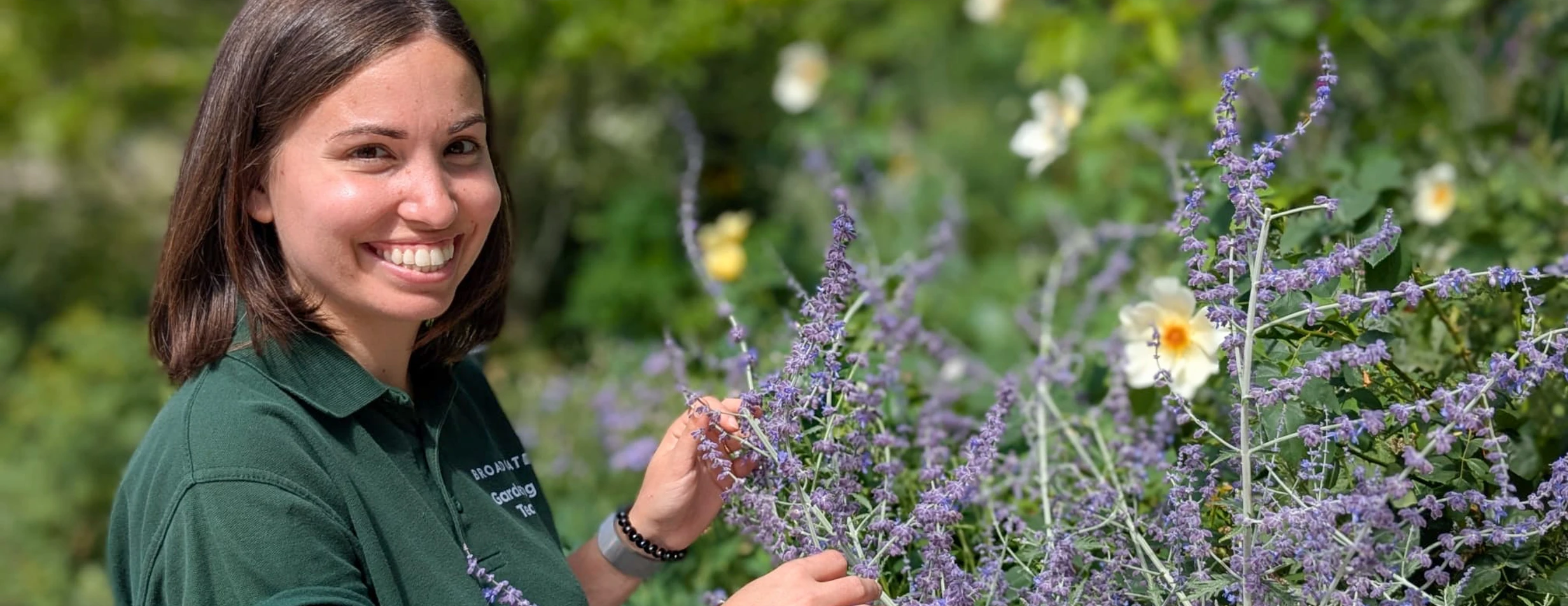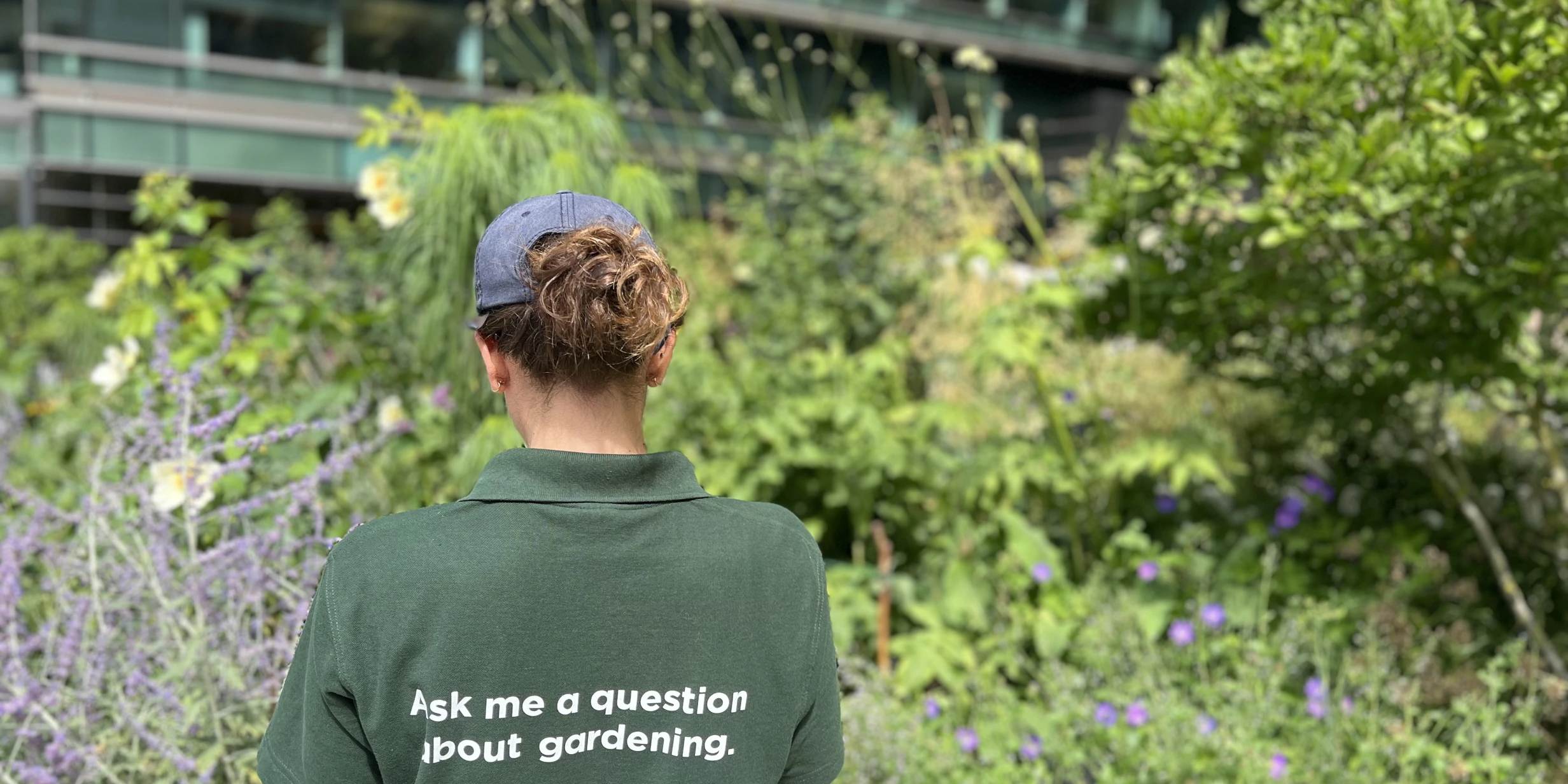Recognising that British Land can only achieve our ambitious 2030 sustainability goals by working with others, we’re asking supplier partners to share their insights. Here, Tiziana Lia of Quality & Service Limited reflects on how sustainable gardening at Broadgate is good for people and wildlife, adding value for our customers.
As Head Gardener at Broadgate, I’m so proud of how people are enjoying and interacting with the green spaces across the campus, especially the 1.5-acre park British Land has created in Exchange Square, suspended above the tracks of Liverpool Street Station.
THE ARRIVAL EXPERIENCE
Green walkways and spaces across Broadgate make for a beautiful arrival experience. What’s more, there’s scientific proof that interacting with nature on any level helps mental health – decreasing symptoms of depression, lowering levels of stress and anxiety, providing essential vitamin D and bringing mindfulness benefits. This is good news for people and businesses across the campus, promoting wellbeing and employee satisfaction.
Office workers come to sit in the park for lunch and to walk their dogs because a lot of Broadgate offices are dog friendly; families from the wider community also set up picnic blankets on the lawns. There’s an interesting mix of people. Everyone is very mindful and respectful of the space so, even though it’s really well used, it still looks amazing.
LIKE GARDENING A LONG TIME AGO
Q&S always plants with sustainability in mind, as well as what looks pretty. Species at Broadgate include pollinator friendly and drought-tolerant perennials like Salvia Nemorosa, known for its deep violet-purple flower spikes, Euphorbia Wulfenii, with its fabulous show of yellow flowers in early spring, and Geranium Rozanne, which produces an abundance of purple flowers throughout the year. There’s always something flowering in Exchange Square. My favourite season is spring. You know that everything will come back up, but it’s always unexpected what comes first. It’s a magical time.
As we work organically, we use hand tools as much as possible, like gardeners used to a long time ago. This creates a more mindful environment and means people approach our gardeners because we’re not wearing ear defenders or hiding behind noisy equipment. Our uniforms encourage people to ask us questions about gardening and a lot of Broadgate customers do. We often get compliments on the gardens too, which makes the whole team feel appreciated!
A THRIVING ECOSYSTEM
It’s special to have such a thriving ecosystem in an urban setting. British Land’s ethos really aligns with our own. As they deliver their Broadgate Nature Action Plan, there’s lots happening across the campus. Planting has recently completed on 18 huge terraces at 1 Broadgate and there are more projects in the pipeline.
Q&S gardens for people and wildlife. So our environmental maintenance practices are chemical free and petrol free. This immediately increases biodiversity, attracting more bees, butterflies and other pollinators to Broadgate. There are Blue Tits nesting in the Birch trees and Goldfinches in the Magnolia trees, which people love watching go in and out. A Kestrel came to drink from the fountain and I saw a spectacular Dragonfly yesterday.
To prolong flowering, we regularly deadhead species like Salvias and Roses and do a ‘Chelsea Chop’ in late spring, pruning some perennials by a third to a half. We leave seedheads on as long as possible into the winter, so they’re there for birds and nesting creatures, keeping wildlife happy and giving people visual interest. We make insect hotels out of cuttings and sow seeds from seedheads. This is sustainability in action.
Broadgate’s plants are so successful, we’re now dividing and self-propagating ones that have grown too big. Sustainable planting includes perennials that grow year after year, which not only saves money but also cuts carbon emissions because you’re not shipping plants and soil. Organic gardening does take more time, but we think it’s worth the effort. What we save on new plants, we invest in our team of four gardeners and an apprentice, who care for Broadgate’s green spaces and engage with customers and visitors.
INVOLVING MORE PEOPLE
I’m excited about involving and educating more people in organic gardening. The techniques we use on the campus, people can do at home. Even small green spaces can make a difference for people’s mental health and for biodiversity and the planet.
We offer talks for all Broadgate occupiers. Last year, we ran workshops where customers made their own terrariums to take home and learnt how to divide plants to create more. Afterwards, I was pleasantly surprised by how many came to show me what they’d done at home. We’ve also hosted plant giveaways, as well as educational pop ups where we shared daffodils, fatballs and seedheads. Plus, we’ve run a wellbeing session for the front-of-house team at Rapport, supported two green skills weeks for local students and hosted pollinator activities for primary schoolchildren. More workshops with customers are already in the pipeline, exploring the benefits of interacting with nature for mental health.
A PASSION
This is not just a job, it’s a passion. Last year, we won a national BALI award – widely seen as the ‘Oscars’ of the landscaping industry – for grounds maintenance at Broadgate. We’re always looking at how we can improve even more. Plants are like my babies. I want them to grow and thrive, for people and for wildlife.
Explore British Land’s 2030 Sustainability Strategy: Greener Spaces, Thriving Places, Responsible Choices: www.britishland.com/sustainability



